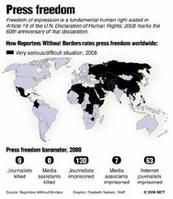

WASHINGTON (AP)
Worldwide, the environment for journalists grew more hostile last year, extending a six-year downturn, United States researchers reported Tuesday.
Setbacks for press freedom outnumbered advances two to one across the globe, although the Internet and blogs helped slow the decline, particularly in Iran, reported Freedom House, a non-profit organisation that released the report in advance of World Press Freedom Day today.
"There have been repeated crackdowns in the past few years and Iran is on the cusp of the bottom-performing category, but kept out by these forms of expression," said Karlin Karlekar, senior researcher for Freedom House.
Iraq disappointing
Iraq, meanwhile, was again a disappointment. "There hasn't been the improvement in Iraq one hoped for several years ago," the researcher said. "One of the reasons given for the invasion was to bring democracy to Iraq. The democracy that has been established is highly problematic."
Still, the US-backed country was not listed among the worst countries for press freedom. The worst-rated country was North Korea, while Myanmar, also known as Burma, was second with a worsening crackdown in the media.
Cuba, Libya, Turkmenistan, Uzbekistan, Belarus, Zimbabwe and Equatorial Guinea were also among the worst-rated.
One region singled out for praise for overall improvement was the Middle East and North Africa. The average regional score reflected the fact that, in a number of countries, the media environment had benefited from greater access to satellite television service and the Internet, including new formats such as blogs and social-networking websites, Freedom House said.
Egypt upgraded
In addition, in the only positive status change of the year, Egypt was upgraded from 'not free' to 'partly free' as local journalists proved willing to cross "red lines" that had previously restricted their work. A greater range of viewpoints emerged in the traditional Egyptian media and also in the pan-Arab press, informal media, and blogs. This upgrade occurred despite a continuation, and in some cases an increase in government harassment, repression, and imprisonment of journalists.
Since the media played a key role covering coups and contested elections in such countries as Pakistan, Bangladesh and Georgia, journalists became prime targets of government crackdowns, according to the report.
Of 195 countries and territories rated, 72 were cited as free, 59 as partly free and 64 as not free.

